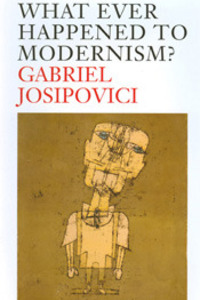
What Ever Happened to Modernism?
Gabriel Josipovici
Yale University Press, London, 2010
By Cora Stam, Literary scholar, philosopher
Read more about Gabriel Josipovici
The disappointing air of pedantic parochialism in modern literature produced by native speakers of the most important language on earth is a paradox that many non-British readers notice and one that forms the thematic spine of Gabriel Josipovici’s erudite (and, for some, explosive) overview What Ever Happened to Modernism?
Josipovici is a French-born academic writer, novelist and critic, working in the UK and saturated in its products since studying at Oxford in the 1950s. Aside from over twenty novels, including the remarkable The Big Glass about Dadaist Marcel Duchamp, he has produced ten scholarly critical works, including The World and the Book, a landmark for literature students since 1971.
When he first came to England, he was keen to explore well-known writers of the time like Anthony Powell, Angus Wilson and Iris Murdoch. But his disappointment was the greater when he noticed that these novelists wrote well, but they didn’t touch him the way that continental writers like Franz Kafka and Marcel Proust had done. Nor, as time passed, did the likes of Ian McEwan, V.S. Naipaul, Julian Barnes, Martin Amis, Blake Morrison, even Philip Roth. Apart from the early works of William Golding and that of Muriel Spark, none of these writers’ works touched him.
Josipovici makes many vivid and entertaining attempts at pinpointing the missing feeling in modern English literature in its widest sense. He portrays it as ‘anecdotal’, ‘smooth’, ‘complacent’, ‘predictable’, ‘comforting’, ‘constricting’ – the sum total leaving him with a feeling that ‘the world has been made smaller and meaner’. All of their mindset and even their much-vaunted irony seem self-protective, or, as he so beautifully puts it, ‘come ultimately out of Philip Larkin’s overcoat’. Other literatures and arts, especially those of multilingual Europe, by contrast, have been delivering broad swathes of stimulating and original modernism from the sixteenth century onwards.
Much of this interesting book is a journey of original comparisons between various types of artists of several epochs and cultures, from Albrecht Dürer to Picasso, from Mallarmé to Wordsworth, from Cervantes to Virginia Woolf – while it always argues that modernism didn’t just start around 1920, with T.S. Eliot and Beckett, but has been alive and well and weaving its non-commercial depth of originality into the human soul for a very long and influential time – largely without the assistance of the English language speakers, with some notable exceptions, like Golding and Wordsworth.
Along the way, Josipovici launches a number of interesting debates (for instance on the value of Irène Némirovsky and the power of personal story) and theories (e.g. the split between popularity and artistic depth evident in a Verdi, a Balzac or a Dickens). As for Némirovsky, Josipovici has his doubts about the quality of her writings: was she really as good as the critics insisted? Isn’t the confusing fact of her being deported and murdered by the Nazis in 1942 the reason she is praised? And what about the amazing story of the publication of the forlorn manuscript of Suite Française, found in an attic, sixty years later? Would she have received the same appreciation without her personal story? ‘What has happened to our culture,’ Josipovici asks himself, ‘that serious and intelligent and well-read reviewers […] should so betray their calling as to go into ecstasies over books like Némirovsky? While, in their lifetime and now after their deaths, ignoring the work of novelists like Claude Simon, Georges Perec, Thomas Bernhard and Gert Hofmann?’ (p. 171)
These are reasons aplenty to find this book entertaining and original. Instead of the obvious Nietzsche, Josipovici has chosen the well-handled guidance of Kierkegaard for this journey through modernism. For Kierkegaard explores ‘what it might mean for a youth with brains and imagination to grasp that he was free to do what he wanted and to grasp at the same time that that freedom condemned him to a life of melancholy and inaction’. (p. 43) This sort of power to identify and describe thinkers who reach for more is the real strength of Josipovici.
The book is written in a hugely likeable style, strangely like the very best that English can achieve. It is, by the author’s admission, a personal account and an attempt to persuade without itself drawing any firm conclusions, because the explorations it refers to are forever ongoing. It is, ultimately, a personal mapping of what modernism means to Josipovici. And he might be the first to admit that his own title rather limits the immense scope of the investigations he begins. ‘Modernism’ hardly matters when your real subject is the question of what makes literature satisfyingly profound.